- Register
- Log in to Tune-In
- Wishlist (0)
-
Shopping cart
(0)
You have no items in your shopping cart.
Beatles News

The Beatles’ “last song ever,” released 61 years after their first single, was bound to be significant.
But how did John Lennon’s lo-fi, 40-something-year-old cassette recording of Now and Then — deemed “fucking rubbish” by George Harrison during the failed 1995 attempt to revive the song — become an instant No. 1 chart hit and worthy addition to the Beatles’ catalogue in 2023?
Beyond the AI-assisted salvage of Lennon’s voice from the noisy cassette, it is worth examining Lennon’s raw materials, and the strategies that made the unfinished late-1970s musical sketch a Beatles’ song.
Had Harrison told Lennon himself that the song was rubbish, Lennon might have responded, “Well I’m not finished with it yet, am I mate?”
Lennon’s original “demo tape” was not made for formal presentation (to a music publisher, for instance).
It was a personal memorandum to capture basic song ideas — something musicians do all the time. If they stopped there, Yesterday would be Scrambled Eggs, and the Rolling Stones’ Satisfaction would be one minute of Keith Richards’s signature riff and 4 details

Sir Paul McCartney had doubts all the way through finishing The Beatles' last song 'Now And Then' - but knowing the late John Lennon would have "loved it" kept him going.
From a demo late frontman John Lennon recorded, they used groundbreaking audio technology to beautifully restore his vocals and ‘reunite’ the group - which also included the late George Harrison and drummer Sir Ringo Starr, 83, one last time.
However, McCartney, 81, admits he questioned himself throughout the process about whether or not they should be doing it.
He told MOJO magazine: "It’s strange when you think about it. There’s him in his little apartment in New York City banging away at his piano doing a little demo, and ... our team has restored it so now it's a crystal clear, beautiful vocal. How much would John have liked that?! He would have loved that."
Macca asked himself: "Is it a bit inferior? Is it something we shouldn't do? Am I pushing the envelope too far? But every time I thought like that, I thought, Wait a minute, let's say I had a chance to ask John, 'Hey John, would you like us to finish this last song of yours?' I'm telling you, I know the answer would have been... "Yeah.'"
S details
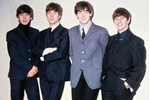
Much has been made of the fact that The Beatles have a new song out. The band used AI technology to finish a John Lennon demo titled “Now and Then,” and the two remaining members, Paul McCartney and Ringo Starr, were able to complete the tune and put it out in the world. This week, it gives the band another major hit, and it helps them make history in a very specific manner.
“Now and Then” opens at No. 7 on this week’s Hot 100. The chart tracks the most-consumed songs in the U.S. using a methodology that combines sales, streams, and radio play. The latest from The Beatles succeeds across all those metrics, and it may just be getting started.
With their latest top 10 hit, The Beatles have become just the second band in U.S. history to reach the highest tier on the Hot 100 in four distinct decades, according to Billboard. They join Aerosmith in this odd bit of chart history.
The Beatles first reached the Hot 100 in the 1960s. That decade would turn out to be their most productive, and it saw them reach the top 10 with dozens of songs. They returned again in the ‘70s, but that decade was when they officially split. They found their way back to the top 10 in the ‘90s details
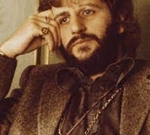
The Beatles' "Don't Pass Me By" is one of two Fab Four songs Ringo Starr is credited with writing himself. "Don't Pass Me By" set Ringo on a country-fried path.
The Beatles‘ “Don’t Pass Me By” is one of only two Fab Four songs Ringo Starr is credited with writing himself. The second one is a lot more famous. Regardless, “Don’t Pass Me By” set Ringo on a country-fried path.
Only two Beatles songs have Ringo as their sole credited writer: “Don’t Pass Me By” from The White Album and “Octopus’s Garden” from Abbey Road. During a 2008 interview with Goldmine, Ringo discussed the former. “Well, ‘Don’t Pass Me By’ was the first song I’d written that we recorded,” he said. “I’d written other songs, but they were always other people’s song; I just rewrote the words. I used to say that I was rewriting Jerry Lee Lewis B-sides.
“It was just a thrill,” he added. “I remember writing it at the piano at this home in England that we were living in at the time. Then for me and ’til this day, it’s still magic when I write a song and get together with other musician details

In a new podcast McCartney: A Life in Lyrics, Sir Paul McCartney talks about his most famous songs with the poet Paul Muldoon. The podcast is aimed at “dissecting the people, experiences, and art that inspired McCartney’s songwriting.” A recent episode explored the meaning of the lyrics of the title song of the Beatles’ last album, “Let it Be.”
When I find myself in times of trouble, Mother Mary comes to me
Speaking words of wisdom, let it be
And in my hour of darkness she is standing right in front of me
Speaking words of wisdom, let it be
Let it be, let it be, let it be, let it be
Whisper words of wisdom, let it be
The song arose in times of trouble. War raged in Vietnam, riots rocked the Chicago Democratic convention, and students protested all over the world. Rev. Martin Luther King, as well as presidential candidate Robert Kennedy, both died by the bullets of assassins. It was a time of trouble for McCartney personally, as the Beatles were fighting over finances and heading for their breakup at the end of what he called “the crazy sixties.”
Source: Dr. Christopher Kaczor/wordonfire.org

A ROLLS-ROYCE "invention" made by Beatles legend Ringo Starr has hit auction for a bargain price - but don't expect to drive it.
Ringo recycled two original Rolls-Royce radiators to make a stylish wood and metal table. He was inspired to design the table after passing a car showroom near his home in Highgate, north London. Appearing on Blue Peter to discuss the table in 1971, Ringo said that it had been tricky finding authentic Rolls-Royce radiators for the table.
Rolls-Royce would only sell radiator parts to customers with a chassis number - which Ringo did not have. Ringo ended up buying the radiators from a dodgy dealer - who delivered them on foot in a plain bag and would not say where he got them.
The table was produced by Ringo or Robin Ltd, a firm founded by the Beatles star and his craftsman friend Robin Cruickshank. The company's office was on the top floor of the Beatles' Apple Corps HQ on Savile Row.
Cruickshank also designed much of the furniture for Ringo's house in Highgate, north London. The table is 168cm long, 66cm high and 60cm high, with its middle section made from Amboyna wood.
Source: Harry Goodwin/thesun.ie
details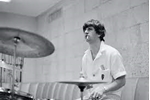
The Beatles' Ringo Starr covered a sentimental song after the Fab Four's breakup. Quincy Jones had some negative things to say about Ringo's cover.
The Beatles’ Ringo Starr covered sentimental songs after the Fab Four’s breakup. On his solo debut record. he recorded a quaint 1950s hit that he liked as a child. Quincy Jones had some negative things to say about Ringo’s cover.
During a 2015 interview with Goldmine, Ringo was asked if he wore out any of his records as a child. “You know, as a kid, I didn’t really wear out any records,” he recalled. “I did buy The Four Aces’ ‘Love Is a Many-Splendored Thing.’ I mean, that’s a memory I have of early days.” Ringo covered “Love Is a Many-Splendored Thing” for his debut solo album, Sentimental Journey. The record features covers of many pre-rock ‘n’ roll musical standards.
However, Ringo wasn’t only interested in the musical stylings of The Four Aces. “But then when rock ‘n’ roll came in, I’d play records by Little Richard,” he added. “But I had country music as well, people like Patsy Cline, Ernest Tubb, and Kitty West was my he details

The Beatles are back inside the highest tier on the Hot 100 this week with their “last” single “Now and Then.” The tune opens at No. 7 on the ranking of the most-consumed songs in the nation. As the Fab Four arrives once again, they break a number of records, including one held by perhaps the most famous piano star of all time.
As “Now and Then” debuts inside the top 10 on the Hot 100, it extends The Beatles’ time between their first win and their latest on the chart. According to Billboard, the band now claims the longest span between a debut top 10 and the last to hit the uppermost region on the tally.
The Beatles first reached the top 10 on the Hot 100 back in January of 1964. The band’s “I Want to Hold Your Hand” reached the competitive region, eventually climbing to the No. 1 spot. With their brand new smash, the band’s span of top 10 wins is now more than 59 years long.
Before “Now and Then” hit the top 10, Elton John claimed this bit of history. His span was more than 51 years long. John reached the top 10 on the Hot 100 for the first time in January 1971 with “Your Song.” He returned to the arena many times, details

“Living the Beatles Legend: The Untold Story of Mal Evans” — the new biography of the Fab Four’s roadie and personal assistant in their innermost circle — was titled “Living the Beatles Legend, Or: 200 Miles to Go” when it was Evans’ own manuscript, the publishing of which was tabled after his untimely death in 1976.
And the tale behind that is just one of many magical mysteries unraveled in the book.
“The story comes from January 1963,” “Living the Beatles Legend” author Kenneth Womack told The Post. “‛Please Please Me’ was about to be their first No. 1 single [in the UK]. This is do or die time. You gotta get down to London, be on all big shows. You know, it’s now or never.”
And when his fellow Beatles roadie Neil Aspinall got the flu, it was up to Evans to literally take them on the road from Liverpool to London during a snowstorm in the midst of the UK’s historic Big Freeze.
“So England was essentially cut off by ice, and Mal drove them down — and Liverpool is 200 miles from London,” said Womack. “On the way back, the windshield cracked and basically exploded. Mal knoc details

Paul McCartney, the legendary musician and co-founder of Meat-Free Monday, has a special surprise in store for his fans. McCartney recently announced a unique opportunity for one lucky fan and a friend to join him on the final show of his Got Back Tour in Rio de Janeiro, Brazil.
Fans from around the world are likely eagerly awaiting the chance to be a part of this once-in-a-lifetime experience. But this is no ordinary giveaway—it is a fundraising initiative to support Meat-Free Monday, a cause close to McCartney’s heart.
“I’m heading back on tour with a very special announcement just for you,” McCartney says on the campaign page. “I’m adding one fan and a friend to my VIP guest list on the final show of my Got Back Tour in Rio De Janeiro, Brazil. I’ll set you up with VIP tickets, access to the soundcheck, and to the meet-and-greet. It’s going to be great.”
Source: Nicole Axworthy/vegnews.com
details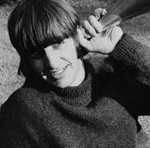
The Beatles' "Strawberry Fields Forever" includes some of Ringo Starr's most inventive drumming. The singer explained what he was thinking when he made his contribution to the track.
The Beatles’ “Strawberry Fields Forever” includes some of Ringo Starr‘s most inventive drumming. The “Back Off Boogaloo” singer explained what he was thinking when he made his contribution to the track. Interestingly, “Strawberry Fields Forever” was a bigger hit in the United Kingdom than it was in the United States. While the tune became famous, Ringo said fame was not the motivating factor for the Fab Four.
During a 2015 interview with Goldmine, Ringo was asked about the drum pattern at the end of “Strawberry Fields Forever.” “You know, what you’re talking about just happens,” he said. “There was no plan for that. I can play basic patterns and the freedom is the fills.
“To move it to where you can put it in a different space as a drummer, especially with The Beatles, only came at the end because the songs were so set up that there was two verses, a chorus, a verse, a middle eight and a chorus and something like that,” he added. details

Giles Martin, the co-producer of the Beatles’ new song Now And Then, has shed some light on George Harrison’s lack of love for the track when they recorded it in the ’90s.
Touted as the fab four’s “last”, Now And Then features sonic contributions from all four Beatles: George Harrison, John Lennon, Paul McCartney and Ringo Starr. The song arrived earlier this month and is part of the newly remastered The Beatles 1962-66 (aka The Red Album) released last week along with The Beatles 1967-1970 (aka The Blue Album).
In addition to the cleaned-up audio sourced from a John Lennon demo tape dating back to the late 1970s, the song features guitar contributions from the late Harrison, who made no secret of his dislike of the song.
Asked if there were concerns about Harrison’s wishes being posthumously overruled with the release of Now and Then, Martin told MOJO magazine: “No, because of course this wouldn’t happen without [George’s widow] Olivia and [son] Dhani’s approval.”
“It wasn’t that George didn’t like the track,” the producer explains.
“It was that they’d done the other two and the qu details
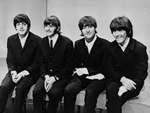
The Beatles, in the year 2023, have a hit song.
In the first chart week following the release of the song “Now And Then,” the track topped the U.K. singles chart. Official Charts notes it’s the band’s 18th No. 1 single in their native country. It’s also their first No. 1 single in 54 years since “The Ballad of John and Yoko” topped the charts in 1969.
“Now And Then” is also the most-streamed Beatles song in one week ever in the U.K. The new single netted over 5.03 million streams in one week of release. The next highest streaming figure in one week came in 2021 when “Here Comes the Sun” was streamed 1.05 million times.
Meanwhile, in the United States, “Now And Then” debuted on the Billboard Hot 100 chart at No. 7, which is The Beatles’ 35th top 10 single. This is The Beatles’ first top 10 song on the Hot 100 since the release of “Free as a Bird” from Anthology in 1996.
Citing Luminate, Billboard notes “Now And Then” had “11 million streams, 2.1 million in radio reach and 73,000 physical and digital singles sold.”
Source: Erica Banas // Rock Music Reporter/rock929ro details

Joni Mitchell and John Lennon famously wrote beautiful songs but their feud got surprisingly ugly.
Joni Mitchell was mad at John Lennon due to unwanted advice he gave her about her music.
Mitchell resented Lennon's comments.
Elvis Presley also reportedly hated Lennon.
Similar to influential bands like Fleetwood Mac, Joni Mitchell is an icon who has changed the course of music history. Given everything that Mitchell accomplished, it certainly seems like her peers like John Lennon should have praised her.
Even though the two celebrated artists seemed to have a lot in common, however, Lennon made remarks that insulted Mitchell. In response, the beloved folk singer seemed to be extremely angry with the former member of The Beatles.
Source: Matthew Thomas/thethings.com
details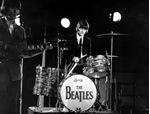
Even though it's received reverent reviews, Ringo Starr has issues with The Beatles' "Rain." "Rain" was a hit in the United States, but it didn't chart in the United Kingdom.Even though it’s received reverent reviews from music critics, Ringo Starr criticized The Beatles’ “Rain.” He compared it to other songs that feature his drumming. While “Rain” was a hit in the United States, it didn’t even chart in the United Kingdom.
During a 2015 interview with Goldmine, Ringo discussed his drumming on “Rain.” “It’s not my best playing; it’s just different,” he said. “I played ‘Rain’ and I’ve never played like it since or before it. It’s very busy for me.”
“I always tend to take the fill half-time whereas with that song it was full-on [smacks his hands] fast!” he added. “If anyone asks me about my strangest drumming, it’s ‘Rain.’ I don’t think it’s the best I ever played and I don’t think it’s the most inventive I’ve ever played but it’s certainly different than 99% of everything else I’ve played.”
Source: Matthew Trzci details
